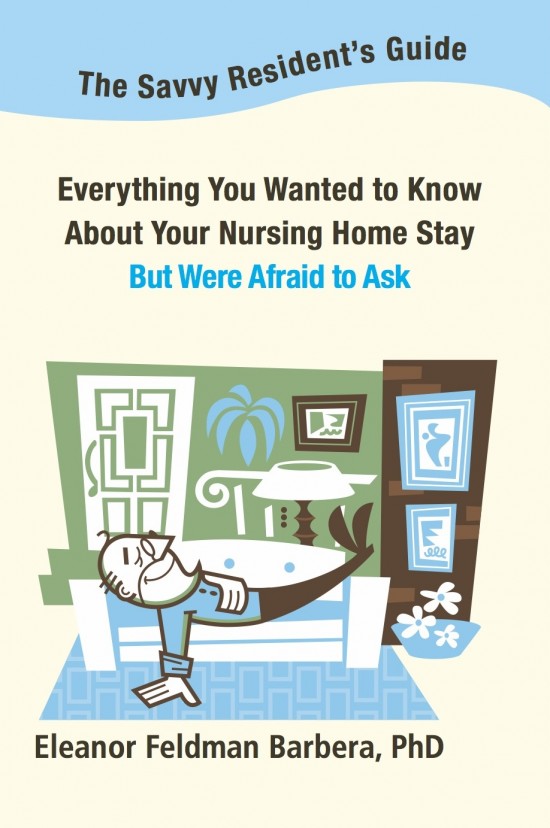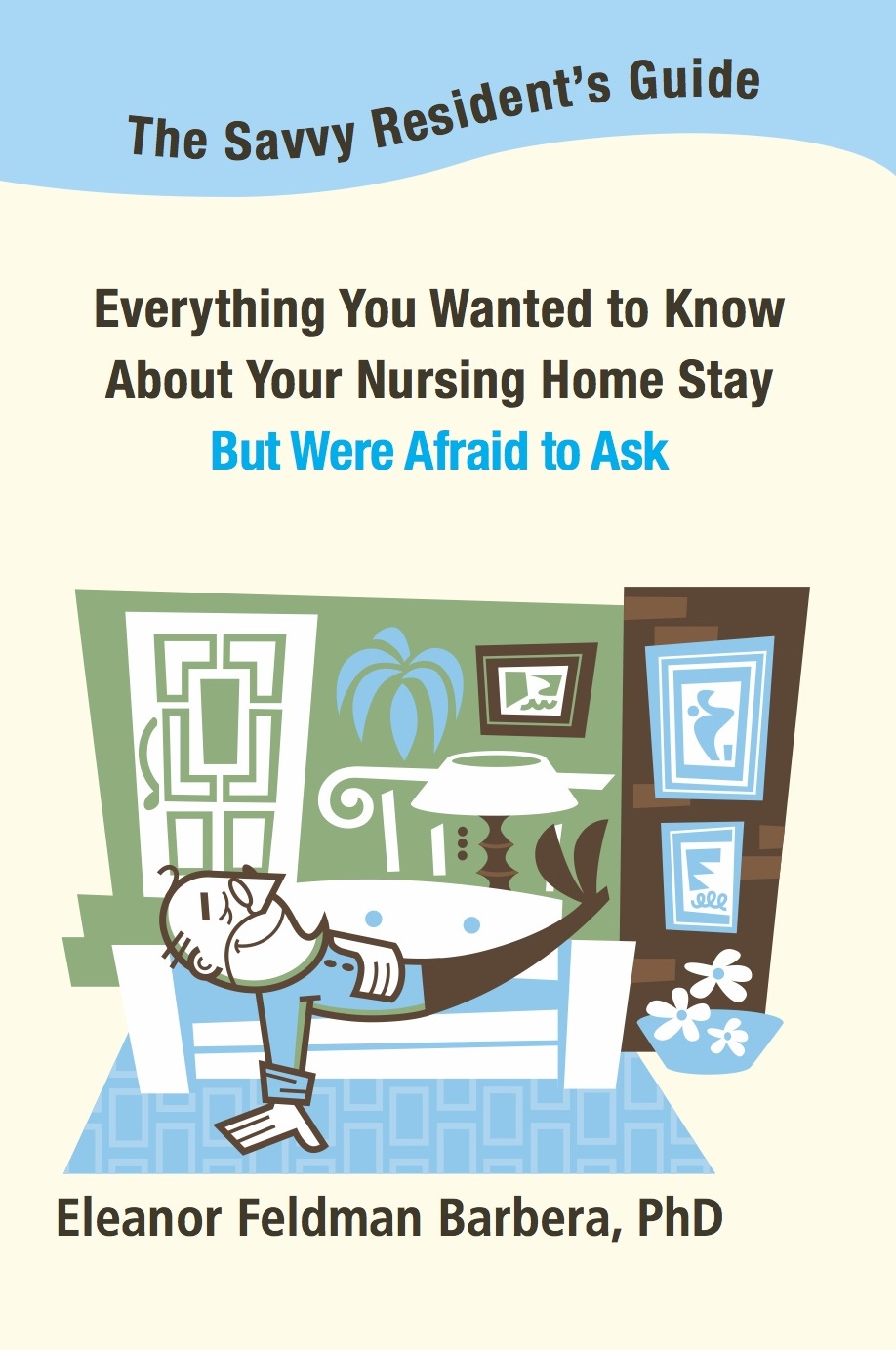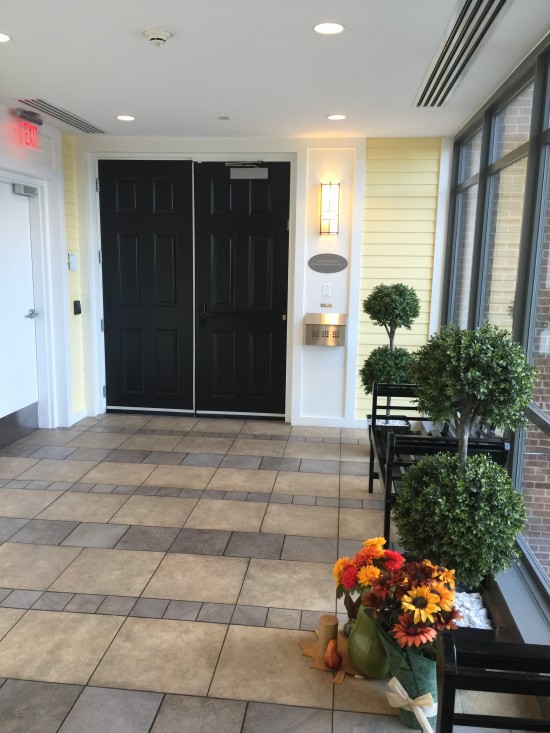Category: Dementia
Posted by Dr. El - November 12, 2018 - Business Strategies, Dementia, McKnight's Long-Term Care News, Motivating staff, Personal Reflections, Resident care

Here’s my latest article on McKnight’s Long-Term Care News:

I headed to the 2018 LeadingAge convention last week looking for a fix of long-term care enthusiasm and that’s exactly what I got.
I met up with old colleagues, put faces to voices I’d spoken to for years and wandered through the expo hall catching snippets of conversations that might be exciting only to long-term care professionals.
PDPM
Armed with a large cup of black coffee, I attended an early morning seminar on the Patient-Directed Payment Model (PDPM), mostly so I’d know what everyone was freaking out about at work. “Are there any payment adjustments for residents with behavioral health problems?” I inquired of the speakers. “No,” came the reply.
Facilities will continue to have to manage residents with anxiety, substance abuse and other difficult and time-consuming behaviors without financial remuneration through PDPM. For those looking for immediate answers, consulting psychologists can be a good resource for staff training and local associations may be able to offer educational sessions on specific topics across facilities.
Team building
I participated in a session offered by Christopher Ridenhour, GFN entitled, “The Other Voice: Race, Class, Culture and the Other ‘Isms’ in Aging Services.”
“And you wonder why we have a staffing crisis,” he said, pointing out, for example, that attendees walking briskly through the conference hall without acknowledging one another were likely to be doing the same thing with their staff members back at home.
Ridenhour emphasized that all workers, regardless of their race, age or any other characteristic, want to be recognized and appreciated.
The session included practice exercises that highlighted commonalities between participants. I left with a new friend with whom I “LinkedIn” the next day. We were born in different countries, work in different LTC roles and have almost a decade between us, but given the directive to “tell each other your life story in thirty seconds,” we found the kind of common ground that any employer would want for their team members.
Montessori for staff
The theme of connection was echoed in a session offered by psychologist Cameron Camp, Ph.D., and his colleagues at the Center for Applied Research in Dementia on teaching Montessori techniques to staff members.

Posted by Dr. El - January 19, 2017 - Dementia, Engaging with families, McKnight's Long-Term Care News

Here’s my latest article on McKnight’s Long-Term Care News:

As I’ve mentioned in past columns, delivering high quality care for residents and their families means accepting our role not only as care providers but also as educators throughout the process.
This often involves teaching family members about illnesses so that they can become strong members of the treatment team, rather than bringing sweets to someone with diabetes or inadvertently agitating a resident with dementia.
As anyone who’s visited a doctor knows, however, it’s easy to become overwhelmed and to have the information presented by the medical professional blur so that it sounds like a Charlie Brown cartoon teacher declaring, “Wa wa wa wa, wa wa wa wa wa wa.”
I recently learned of a promising program to teach families — particularly Hispanic families — about dementia in a manner that makes the information easier to hear: an audio-visual novella called “Forgotten Memories” (“Recuerdos Olvidados”), which is available on YouTube in English and in Spanish.
The novella, by the University of Southern California School of Pharmacy in association with USC Good Neighbors Campaign, USC Dornsife College of Letters, Arts and Sciences, and USC Alzheimer Disease Research Center, tells the story of a man whose forgetfulness begins to impact his daily life and to affect three generations of his family.
For the entire article, visit:

Posted by Dr. El - December 7, 2016 - Books/media of note, Bullying/Senior bullying, Business Strategies, Common Nursing Home Problems and How Psychologists Can Solve Them, Customer service, Dementia, Engaging with families, McKnight's Long-Term Care News

The Savvy Resident’s Guide can help set reasonable expectations for your new residents and families, leading them to view their stays in a more favorable light. To see how, download a FREE Kindle version between December 7-9th and take advantage of Holidays Savings of 20% off bulk orders of 25 or more copies through Friday, December 23rd. Use the code MCKNIGHTS at checkout.
It’s like giving people 24/7 access to an experienced nursing home shrink who tells it like it is with gentle humor and answers every question before it’s asked. Put a copy in every rehab room and watch your customer satisfaction reviews improve!
For more great resources, read my latest article on McKnight’s Long-Term Care News:

Over the past year, I’ve been involved with several exciting long-term care-related projects that I can now tell you about. In the spirit of the season, I wanted to spread some good cheer with them*, and also offer a gift.
The first is a book entitled “Bullying Among Older Adults: How to Recognize and Address an Unseen Epidemic” by Robin P. Bonifas, to which I had the honor of contributing a chapter. This volume addresses the effects of bullying among seniors and outlines actions which facilities and communities can take to address the problem. It provides step-by-step assessment strategies and anti-bullying interventions that will increase staff awareness and improve day-to-day interactions.
In another publication, fellow geropsychologists Kelly O’Shea Carney and Margaret P. Norris have put their years of experience to paper in “Transforming Long-Term Care: Expanded Roles for Mental Health Professionals.” As I state in my review of their work, “The book will … appeal to long-term care policy strategists and facility managers looking for ways to reduce costs while improving care quality and staff turnover.” The book digs deeper into the Eldercare Method (which I earlier discussed here) and outlines ways in which long-term care can make better use of its consulting psychologists.
.
.
.
And finally, I’d like to offer the opportunity to download — through this Friday — a free Kindle version of my book, “The Savvy Resident’s Guide: Everything You Wanted to Know About Your Nursing Home Stay But Were Afraid to Ask.” This large-print guidebook provides essential facility-friendly information in an entertaining format for residents and family members regarding how to make the most of their time in a nursing home. (If you like it as much as I think you will, order here by Dec. 23 for a 20% discount for purchases of 25 or more. Use the code MCKNIGHTS upon checkout.)
*Full disclosure: I do not benefit financially from mentioning the resources of my colleagues or from any purchases of their products.
For the entire article, visit:

Posted by Dr. El - November 12, 2015 - Business Strategies, Customer service, Dementia, End of life, McKnight's Long-Term Care News, Medication issues, Motivating staff, Resident care

Here’s my latest article on McKnight’s Long-Term Care News:

Despite the diversity of the events I attended during my brief visit to the LeadingAge convention in Boston last week, a theme clearly emerged. The thread that ran through the varied offerings was well-being.
Retaining staff
In researcher and consultant Joanne L. Smikle, PhD’s talk on staff retention, rather than focusing on why employees are leaving, she looked instead at why they stay.
Based on her studies of long-term care organizations, she found that “if the leadership of the organization lacks passion, you will have trouble with retention and commitment.”
In healthy organizations, staff members “from the top of the house to the bottom of the house” stay because they can say, “I felt I mattered.” Experiences that contribute to that feeling: Recognizing staff in formal and informal ways, an open dialogue with staff rather than top-down communication, and a focus on the human elements enabling employees to make connections with each other, the residents and the families.
Dementia care
G. Allen Power, MD, FACP titled his presentation, “Enhancing well-being for people living with dementia,” so it wasn’t surprising that this was a central point in his talk.
He asserted that antipsychotics don’t work and don’t treat the true causes of the behaviors associated with dementia. Instead, he recommends focusing on the seven primary domains of well-being, which are part of the Eden Alternative model of care: identity, growth, autonomy, security, connectedness, meaning and joy.
In one instance, a resident who became agitated when he was prevented from leaving the building was allowed outside. The man looked at the cows in a nearby field and returned to spend the rest of the day calmly. The team, who subsequently learned that the resident had been a farmer whose daily routine included an early morning check on his animals, had given him not only autonomy, but had also affirmed his identity and added meaning and joy to his life. His agitation disappeared.
Keynote address
Atul Gawande, MD delivered a Monday morning keynote address. Author of the book “Being Mortal,” Dr. Gawande discussed ways in which to improve end of life treatment. He advocated for care that takes into account the desires of the patient and noted that there is more to living than extending the amount of time we live.
For the entire article, visit:

Leonard Florence ALS unit entrance
Posted by Dr. El - July 15, 2015 - Communication, Dementia, Inspiration, Technology, Transitions in care

I wrote about the White House Conference on Aging last October, noting that it was a “once-a-decade” national conference about the needs of our aging population.” (McKnight’s LTC News, October 2014)
Below, LeadingAge summarizes the 2015 White House Conference on Aging, which took place on Monday:
After a year’s worth of collecting data and opinions, experts from the field of aging presented new ideas and initiatives at the 2015 White House Conference on Aging (WHCOA).
The White House Conference on Aging facilitated a national conversation on growing older in America through live-streaming social media. LeadingAge hosted a watch party and found the following highlights noteworthy:
- A Call for Caregiver Support Systems: Panelists stressed the importance of establishing support systems for the nation’s 50 million professional and family caregivers, whose numbers will double by the year 2050.
- CMS Proposed Rule: CMS proposed Reform of Requirements for Long-Term Care Facilities, which would affect more than 15,000 nursing homes and skilled nursing facilities. A element of the proposal is new standards for coordinating facility-to-facility patient transfers in order to improve quality of life, enhance person-centered care and services for residents in nursing homes, and improve resident safety.
- HHS Secretary Announces Funding for Workforce: Sylvia Burwell, secretary of the U.S. Department of Health and Human Services (HHS) announced $35.7 million for a new Geriatric Workforce Enhancement Program, preparing the health care workforce to respond to the needs associated with advancing age.
- Dementia Friendly America: A coalition of private sector organizations announced the Dementia Friendly America initiative, which was created to foster communities that are equipped to support people with dementia and their families. There are currently plans to build 15 new pilot sites across the country.
For the rest of the article, visit:

Posted by Dr. El - May 27, 2015 - Dementia, Engaging with families, McKnight's Long-Term Care News, Resident care, Role of psychologists

Here’s my latest article on McKnight’s Long-Term Care News:

A recent Iowa court case acquitted Henry Rayhons of sexually abusing his wife, who had Alzheimer’s dementia and lived in a nursing home. The case not only prompted national debate, it led those in long-term care to consider how to handle sexual activity within the bounds of their facility, particularly in cases when one or both of the parties have a diagnosis of dementia.
Psychologists are frequently asked to determine whether or not a patient has the capacity to understand or authorize various aspects of care, including their ability to consent to sexual behavior.
Eric Redlener, PhD, president of The PsychAssociates Group, a company that provides psychological services to long-term care facilities, held a meeting for its supervisors to discuss the challenges that arise when considering capacity, sexual activity and the senior living environment.
I was on the conference call since I work for them regularly. Here is a fly-on-the-wall account of the concerns raised during the meeting.
Staff issues
Some of the challenges to handling sexual behavior in the long-term care environment involve the reactions of staff members to the situation.
· Some staff members show squeamishness about “Grandma and Grandpa” having sex.
· Staff members may be concerned, rightly or wrongly, that residents will be taken advantage of.
· Staff members project their notion of sex onto elders. Elders may be content with holding hands or heavy petting, but staff might be anticipating people “swinging from the rafters.”
· Sometimes an administrator or director of nursing bans sexual activity among the residents, considering it “bad behavior,” despite the fact that it’s a legal right in many states for residents to be able to engage in sexual relations within a long-term care facility.
Family concerns
The reaction of family members to the romantic/sexual involvement of their elders can vary greatly.
· Some family members are able to accept their loved one’s need for intimacy, despite its sometimes unexpected expression, such as when an elderly heterosexual mother spends time cuddling with another woman on the floor, or a husband with dementia becomes involved with a woman who is not his wife.
For the entire article, visit:

Posted by Dr. El - May 13, 2015 - Bullying/Senior bullying, Dementia, McKnight's Long-Term Care News, Resident care, Something Good About Nursing Homes

Here’s my latest article on McKnight’s Long-Term Care News:

I’ve been fortunate enough to attend several senior living conventions recently and my enthusiasm for the experience has yet to diminish. If you haven’t yet had the opportunity to be present for a conference (or if it’s been a while since your last one), consider these reasons for attending:
• There are interesting discussions that directly relate to day-to-day work. Hearing different ideas and perspectives can offer a new way to handle problems and can help you get out of a work rut.
• The conference discourse provides a great opportunity to brainstorm, on your own or with colleagues and coworkers.
• Attendees are often equally enthusiastic about LTC and the connections made with others there can help implement changes within your organization.
• The new products offered in the expo hall can improve operations and the lives of residents and staff.
• Sharing the lessons learned with coworkers can expand the value of the conference.
If an onsite convention isn’t possible for now, consider attending a virtual event, such as the annual McKnight’s Online Expo, which not only offers educational sessions but also has chat rooms and a virtual expo hall.
My experience at ALFA
My most recent conference was the Assisted Living Federation of America convention last week in Tampa, where I spoke at the session “The Importance of Environmental Factors in Senior Living.” During my whirlwind visit to ALFA, I was also able to take in two presentations and spend time in the expo hall.
One of the sessions was on using recreational activities as a way to improve morale among residents and staff and to promote your organization in the community. I’ve spoken about these goals in my audio, “10 Steps to Making Recreation the Most Valuable Department in the Nursing Home,” and I was encouraged to hear of unique ways senior organizations have been serving these dual objectives, such as knitting caps for premature babies.
The conversation among participants helped me think about the impact that the pro-social engagement of residents has on reducing the problem of senior bullying. If seniors are busy doing good in the world, not only are they less likely to be engaging in negative behavior such as bullying, but the organization has helped to create a culture of caring.
The second talk was a roundtable on engaging staff in order to reduce turnover. The suggestions focused on hiring for attitude and training for skills, being clear about the mission of the organization, and implementing programs that reward employees for their good work.
Expo hall jewels
As usual, I searched the expo hall to find products I knew my residents would appreciate.
Having heard far too many elders complain bitterly about pureed food, I was delighted to find a company that offered puree solidified into colorful, shaped molds that were far more appetizing than typical puree. The saleslady looked askance at my glee about getting to sample her wares — but regular readers know I like to experience things from the residents’ perspective whenever possible.
For the entire article, visit:

Posted by Dr. El - March 18, 2015 - Dementia, McKnight's Long-Term Care News, Something Good About Nursing Homes

Here’s my latest article on McKnight’s Long-Term Care News:

When I learned about Neurocognitive Engagement Therapy for rehabilitation residents, I had the same reaction I did when I first heard about geriatric emergency rooms: Palm-smack to the forehead, “Why didn’t we think of this before?!”
Of course people with dementia aren’t going to do well in traditional rehabilitation settings. We’ve been putting them in large, over-stimulating rooms and asking them to accomplish tasks that are meaningless to them. No wonder they become agitated or withdrawn and are unable to engage in treatment.
Enter NET therapy. Using a $25,000 grant from the Alzheimer’s Foundation of America, Phoebe Ministries, in conjunction with various academic partners, developed and studied neurocognitive engagement therapy, which combines the best practices of dementia care with the tasks of occupational, physical and speech therapies.
The elements of NET Therapy
Like geriatric emergency rooms, one aspect of the NET model involves changing the physical environment so that it’s calming and more conducive to engagement in treatment, such as working one on one rather than in a group.
For the entire article, visit:

Posted by Dr. El - October 3, 2014 - Dementia, For Recreation Staff, McKnight's Long-Term Care News, Something Good About Nursing Homes

Here’s my latest article on McKnight’s Long-Term Care News:

Greetings from Montana! I was in Billings last week conducting a training session for the Montana Department of Health. An enthusiastic group of over 100 LTC staff members from various departments joined the discussion and I came away with some excellent suggestions on how to engage residents with dementia.
The subject of how to best provide care for people with dementia without using antipsychotic medications was a particularly hot one at the conference. As well it should have been.
The topic is particularly timely given that CMS has increased its antipsychotic reduction goal from 15% (below 2011 levels) this year to 25% next year and 30% below for 2016. As G. Allen Power, MD, pointed out in his recent McKnight’s article, antipsychotic medication reduction should be preceded by educating staff members about alternatives to medication.
One important alternative is offering activities that enrich the lives of people with dementia so that they’re engaged in positive pursuits that build on remaining strengths.
Many participants in the Montana training were from the recreation/activities/life enrichment departments and they shared some great ideas they’ve successfully used to engage residents with dementia. These include:
- Off-campus trips to a variety of locations, including many of the scenic outdoor attractions in Montana. “A lot of work, but worth it!”
- A “whack-a-mole” game where residents use water pistols to shoot down plastic cups decorated as moles. A game such as this allows residents to release anger in a healthy, socially acceptable manner. (It was suggested that since I’m from New York City, we use a “whack-a-rat” version, but I think New Yorkers might enjoy “whack-a-pigeon.” Pigeons, or “flying rats,” as some people refer to them, are much more ubiquitous and annoying but get less media attention.)
For the entire article, visit:

Posted by Dr. El - September 4, 2014 - Common Nursing Home Problems and How Psychologists Can Solve Them, Dementia, McKnight's Long-Term Care News, Medication issues, Role of psychologists

Here’s my latest article on McKnight’s Long-Term Care News:

With the mandate to reduce the use of antipsychotics, many facilities are looking for alternative methods to address the behaviors often associated with dementia. There are several good resources available for training staff (such as the Center for Medicare & Medicaid Services’ Hand in Hand toolkit and the Pioneer Network’s programs).
Within each facility is another good resource — your consulting psychologist. Here’s how psychologists can help:
1. Psychology is all about nonpharmocological alternatives. The most frequent question for any psychologist during their career is, “What’s the difference between a psychologist and a psychiatrist?”
The answer: “Psychiatrists go to med school and prescribe medications to help people feel better. Psychologists go to graduate school to study interpersonal interactions and talk with people to help them feel better.”
The cornerstone of what psychologists do is to look at behavior and find ways to treat people without medication. While psychologists might not be able to use the exact same techniques for those with memory loss, they can offer behavioral insights that aid the team.
2. Psychologists are trained to understand group dynamics. They can support ways in which your treatment teams are working well to help those with dementia and offer alternatives in areas where conflicts arise. For example, if psychologists have observed that mealtimes are stressful for staff and residents, they can offer suggestions that reduce triggers for behaviors on the part of persons with memory loss.
3. As part of their studies, psychologists collect and synthesize data. Combined with their group/team experience, this makes psychologists ideal sleuths to gather information from various team members about particular residents and identify the cause(s) of agitation.
The fact that they don’t necessarily leave at change of shift allows them the opportunity to discuss the cross-shift behaviors of the residents.
For the entire article, visit:























